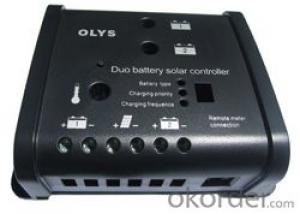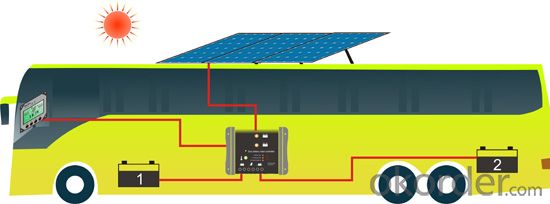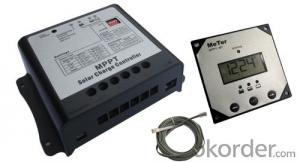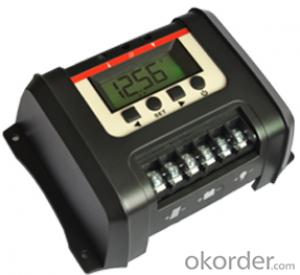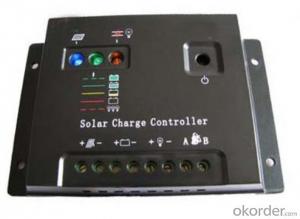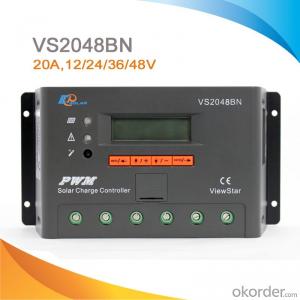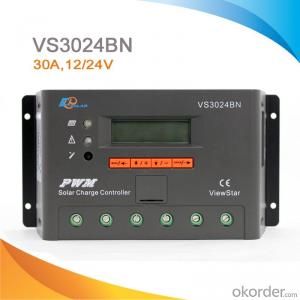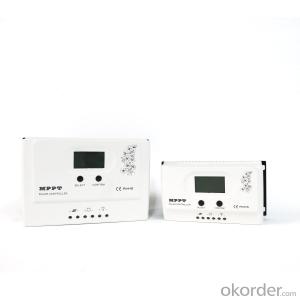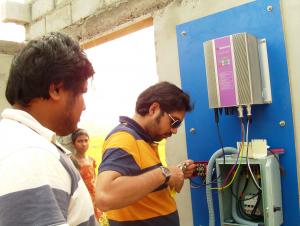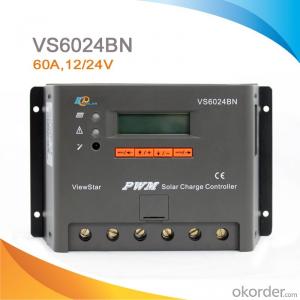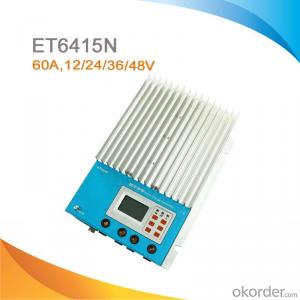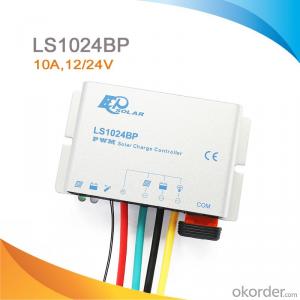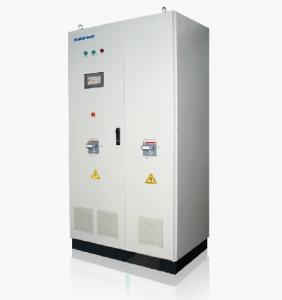One Solar Charge Controllers:RV Solar Power Controller with LCD Display & Remote Meter (Options)
- Loading Port:
- Shekou
- Payment Terms:
- TT OR LC
- Min Order Qty:
- 100 unit
- Supply Capability:
- 100000 unit/month
OKorder Service Pledge
OKorder Financial Service
You Might Also Like
1.The controller is ideal for use with motorhomes, caravans, boats or anywhere there are two independent batteries for instance a starter battery and a leisure battery.
2.Optional LCD Remote meter, you can monitor the charging parameter visual.
3.Automatic recognize 12V or 24V system.
4.The Charging percentages for each battery can be set manually if required.
5.PWM charging, high precision temperature compensation
6.Over charging, short-circuit, reverse polarity & reverse current to PV Protection
Technical data
Float voltageMODEL SDC10 SDC20 Maximum charge current 10A 20A Regulation voltage Automatic recongnize 12V/24V battery type Sealed battery Gel battery Flooded battery regulate voltage 14.2V 14.4V 14.6V Boost voltage 14.4V 14.6V 14.8V 13.7V 13.7V 13.7V Maximum solar voltage 30V Battery voltage range 1-15V Self-consumption 4mA at night, 10mA at charging Metebus connection 8PIN RJ45, 10m Temp.compensation -30mV Terminals 4mm2 temperature -35℃~55℃ Dimension 136.6×104.6×43.4mm weight 0.2kg(main), 0.15kg (remter) IP IP22
All the data is for 12V, For 24V, use 2×
- Q: How does a solar controller prevent voltage instability in the system?
- A solar controller prevents voltage instability in the system by regulating the flow of electricity from the solar panels to the batteries. It monitors the voltage and ensures that it stays within a safe and optimal range by adjusting the charging or discharging rate accordingly. This prevents overcharging or undercharging of the batteries, which can lead to voltage instability and potential damage to the system.
- Q: How does a PWM solar controller regulate the charging process?
- A PWM solar controller regulates the charging process by using a Pulse Width Modulation (PWM) technique to control the amount of energy being delivered from the solar panels to the battery. The controller constantly monitors the battery voltage to determine its state of charge. When the battery is low, the controller allows the maximum amount of current to flow from the solar panels to the battery. As the battery voltage increases and reaches a certain threshold, the controller starts reducing the current flow to prevent overcharging. The PWM technique works by rapidly switching the solar panel's output on and off. The duration of the on and off cycles is controlled in a way that the average voltage supplied to the battery matches its requirements. By adjusting the duty cycle of the switching, the controller regulates the charging current. During the on cycle, the solar panel delivers energy to the battery. When the battery voltage reaches the desired level, the controller switches off the current flow to the battery during the off cycle. This process is repeated continuously to maintain the battery at the optimal charging level. The advantage of using a PWM solar controller is that it provides a more efficient charging process compared to traditional controllers. It allows for a higher charging current during the initial stages when the battery is deeply discharged, ensuring a faster charging time. As the battery voltage increases, the controller gradually reduces the charging current to prevent overcharging and prolong the battery's lifespan. In summary, a PWM solar controller regulates the charging process by controlling the duration of the on and off cycles of the solar panel's output. This technique ensures that the battery is charged efficiently and prevents overcharging, maximizing the battery's performance and lifespan.
- Q: What is the maximum battery voltage for a solar controller?
- The maximum battery voltage for a solar controller typically depends on the specific model and manufacturer. However, most solar controllers are designed to work with battery systems that have a maximum voltage of 12 volts, 24 volts, or 48 volts. It is important to consult the specifications and guidelines provided by the manufacturer to ensure compatibility and avoid any damage to the controller or battery system.
- Q: How does a solar controller prevent damage to solar panels?
- A solar controller prevents damage to solar panels by regulating the amount of voltage and current flowing from the panels to the battery or grid. It ensures that the panels operate within their optimal voltage range, preventing overcharging or overloading, which can lead to damage. Additionally, a solar controller protects the panels from reverse current flow during low-light conditions or at night, which can also cause damage.
- Q: Can a solar controller be used with a grid-tied solar system?
- No, a solar controller is typically not used in a grid-tied solar system. In a grid-tied system, the solar panels are directly connected to the utility grid, and the system relies on a grid-tied inverter to convert the DC power from the panels into AC power that can be used in the home or fed back into the grid. A solar controller is mainly used in off-grid systems to regulate and control the charging of batteries.
- Q: Can a solar controller be used with solar panels that are connected to a solar cooling system?
- Solar panels that are connected to a solar cooling system can indeed be used with a solar controller. The solar controller is a necessary part of any solar power system, including solar cooling systems. Its purpose is to regulate the flow of electricity from the solar panels to the cooling system, ensuring that the panels are operating at their optimal efficiency and that the cooling system is receiving the appropriate amount of power. The solar controller also plays a role in managing the charging and discharging of the batteries within the system. This helps to prevent overcharging or excessive discharge, both of which can cause damage. Additionally, the solar controller monitors the voltage and current output from the solar panels, ensuring that the cooling system receives a consistent and steady power supply. In a solar cooling system, the solar panels gather sunlight and convert it into electricity. This electricity is then used to power the cooling system. The solar controller is responsible for controlling the power flow and ensuring that the cooling system operates effectively. By utilizing a solar controller, the solar cooling system is able to maximize its energy efficiency, reduce energy consumption, and enhance overall system performance. Furthermore, it helps to prolong the lifespan of the solar panels and batteries by preventing potential damage caused by irregular power flow. To summarize, a solar controller is an essential component of a solar cooling system that enables the efficient and effective use of solar panels to power the cooling system.
- Q: How does a solar controller protect batteries from overcharging?
- A solar controller protects batteries from overcharging by monitoring the voltage of the batteries and regulating the flow of energy from the solar panels. When the batteries are fully charged, the controller automatically reduces or stops the charging process to prevent overcharging, which can cause damage and reduce the lifespan of the batteries.
- Q: Can a solar controller be used with solar panels that are connected to a battery isolator?
- Yes, a solar controller can be used with solar panels that are connected to a battery isolator. The solar controller helps regulate and optimize the charging of the battery by monitoring the voltage and current from the solar panels. It ensures that the battery is charged efficiently and prevents overcharging or damage to the battery. The battery isolator allows the solar panels to charge multiple batteries simultaneously while keeping them isolated from each other.
- Q: How does a solar controller handle voltage drops in long wires between the solar panel and battery?
- A solar controller is designed to handle voltage drops in long wires between the solar panel and battery by employing a technique called Maximum Power Point Tracking (MPPT). MPPT is an electronic system that constantly monitors the voltage and current output of the solar panel and adjusts the input voltage to the battery to ensure maximum power transfer. In the case of voltage drops in long wires, the solar controller detects the decrease in voltage and compensates for it by increasing the input voltage from the solar panel to compensate for the losses. By increasing the voltage, the controller ensures that the maximum power from the solar panel is still being delivered to the battery, even if there is a drop in voltage due to resistance in the wires. Additionally, solar controllers often have built-in voltage regulation and protection mechanisms. These mechanisms help stabilize the voltage and protect the battery from overcharging or undercharging. They can detect when the voltage drops below a certain threshold and take appropriate action to prevent any damage to the battery. Overall, a solar controller is equipped to handle voltage drops in long wires by utilizing MPPT technology and implementing voltage regulation and protection mechanisms. This ensures that the solar panel's power output is maximized and that the battery receives the appropriate voltage for efficient charging, regardless of any losses occurring in the wires.
- Q: Can a solar controller be used with a solar tracker?
- Yes, a solar controller can be used with a solar tracker. A solar controller is responsible for regulating the voltage and current from the solar panels to the batteries or grid, while a solar tracker helps optimize the angle and direction of the solar panels to maximize their efficiency. By combining both, the solar controller can adjust the charging parameters based on the position of the solar panels, ensuring optimal energy generation and storage.
Send your message to us
One Solar Charge Controllers:RV Solar Power Controller with LCD Display & Remote Meter (Options)
- Loading Port:
- Shekou
- Payment Terms:
- TT OR LC
- Min Order Qty:
- 100 unit
- Supply Capability:
- 100000 unit/month
OKorder Service Pledge
OKorder Financial Service
Similar products
Hot products
Hot Searches
Related keywords
